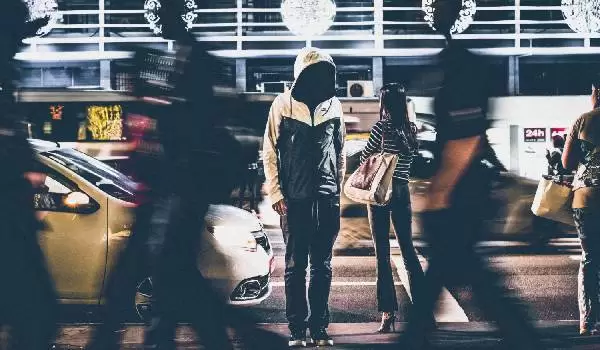
Nowadays, we encounter social anxiety way too often. Every third request addressed to psychologists deals with this phenomenon in one way or the other.
For people who are closely familiar with this “creature”, life is quite hard, because this controlling “lady” requires absolutely everything to be coordinated with her. And her verdicts are harsh and categorical.
You see that group of people looking at you? They are probably discussing why you dressed up in this skirt. With your legs!
Your boss is reading your report with such a face … It is very clear: he thinks that you are an idiot!
Present at the meeting? All your colleagues will listen to your stutter – just sit quietly. They will make all the decisions without your help.
Yes, the waiter brought you a lukewarm soup, with patches of grease floating in it. And the spoon is dirty. And he is not paying attention to you. So, what – now you will make a scene out of it? You are going to protest out loud? Chill out, we both know that you will never speak up.
Attend a party? God forbid! There are people there. Lots of them. Violent people – dancing, having fun, they will drag you along with them. Never. The best party is in a chair with a cup of tea and The Count of Monte Cristo…
So, what is social anxiety?
Social anxiety is irrational illogical fear that is provoked by almost any kind of social interaction. As if some internal alarm is sounding “SOS! People are here! I need to cover and hide!” It is useless to turn to logic in such situations, because while the alarm is sounding – no reasoning can help you. You cannot consciously manage irrational fears.
At the same time, people you’ve been living together with their anxiety know very well that their fears have no basis. They often feel embarrassed that they are not able to overcome or even to control it. This is the kind of “malady” that you can live with, but the quality of your life goes down considerably. Any kind of social interaction, that is necessary for personal and professional growth is out of the question. Not only you are not able to grow and develop – even a simple visit to a store or to a restaurant is impossible without some interaction with other people!
To summarize, you have social anxiety if:
- You are avoiding social contacts and you get extremely nervous if you need to interact with other people.
- You are wary of the situations where you could be judged by others.
- You worry and you have to convince yourself to do simple everyday things that require interaction with other people: calling someone, placing in inquiry with a bank, or discussing an important issue.
- You avoid the situations where you can be in the field (not even in the center) of other people’s attention.
- You are afraid that “they” will think that you are stupid, incompetent, strange, silly, etc.
- You experience strong fear of certain social or professional situations, when other people can influence you or when they may control the situation. You are scared that your actions and the way you express your anxiety will be humiliating for you.
- Instances of social interaction and even the possibility of them may cause strong reactions of your autonomic nervous system: fast breathing, increased perspiration, trembling hands or legs, fast heartbeat, stutter, or nausea.
- Your anxiety is so strong that you can start saying incoherent things, giggle nervously, or vice-versa – you can’t utter a word.
- It is difficult for you to say “No”.
- You feel very uncomfortable in social situations.
- You analyze and criticize yourself after social encounters.
- You are afraid to appear “foolish”.
- It is very difficult for you to perform tasks in the presence of other people.
If we sum up all the above, we will get the set of the main everyday situations that may cause very strong anxiety:
- meeting new people
- theoretical possibility of receiving disapproval or criticism
- being at the center of attention
- contact with the figures of authority
- interacting with strangers
- social relations in general: friendships, business liaisons, romantic connections.
Truth to be told, to some extent this is applicable to all of us. We can be nervous before speaking publicly, when we talk with our boss, and certainly, we don’t enjoy criticism and the situations where we can be judged. However, the main difference is that in normal cases this doesn’t affect our lives negatively. It is unpleasant, but not fatal, as they say.
A person with high social anxiety always has nonending battles in their head. Even mundane everyday situations make them feel SO bad, that nothing else matters.
Natalie has been looking for a job for a long time. Her “financial cushion” that she’s been saving for a rainy day, has shrunk considerably. She had to agree to an offer that really didn’t meet her expectations: her friend helped her get a job as a salesperson at the same company where she worked. Natalie’s main responsibility was the personal interaction with the clients. As soon as she would dial the client’s phone number, her throat would feel dry and her hands would begin to tremble. With much difficulty, overcoming her stutter, Natalie would try to read her notes. After the call, it would take her a lot of time to recover before she could place the next call. In cases where there was a potential conflict when the client had certain complaints about the product, Natalie felt so bad that she would literally shrink in her chair, covered in a cold sweat. In cases of face-to-face interactions, it was even worse. Natalie would stand for a long time before the client’s door: it seemed to her that everyone can see through her. Her suit doesn’t fit her well. She doesn’t look like a sales representative of a company but some kind of imposter. She is incompetent and nobody will even speak to her.
Anxious people have a big fat critic in their heads: he never remains quiet and always criticizes the owner of this head, reminding them that:
- They will embarrass themselves in front of other people, and it will be horrible
- They will show all their weaknesses and embarrassing traits
- Everyone will be pointing at them and laughing
- Everyone will condemn and criticize them
- Everyone will think that they are such an incompetent and unprofessional fool
And once this “apocalyptic picture” is created, the person thinks that they need to avoid it at all costs. The safest thing, of course, is to sit at home. But since life demands that the person works and does various chores, they just need to be super-careful (do not get noticed, blend in, do not stand out).
Nancy by mistake took the wrong bus. After a few stops she realized that she is going not where she needed to be. She was embarrassed to ask other passengers for directions – everyone would know that she, Nancy, made a mistake and took the wrong bus. This was unbearable to her. She got out in the middle of nowhere as if this was planned. The main thing is that others didn’t realize that she made a blunder.
Important point: you can deal with social anxiety on your own or with the help of a psychologist, and we are here to help. Our section “Psychosutra” has a new series of articles on this issue. But if your symptoms are so strong that they show up in more and more everyday situations, if you are constantly reducing your circle of interactions and prefer to stay home, then you are probably experiencing sociophobia. In this case, you need to see a psychiatrist to deal with this anxiety disorder.
Self-therapy can be an essential tool for personal growth and self-improvement.
Browse through our courses and see the positive changes they can bring to your life.
You are not sure where to begin?









